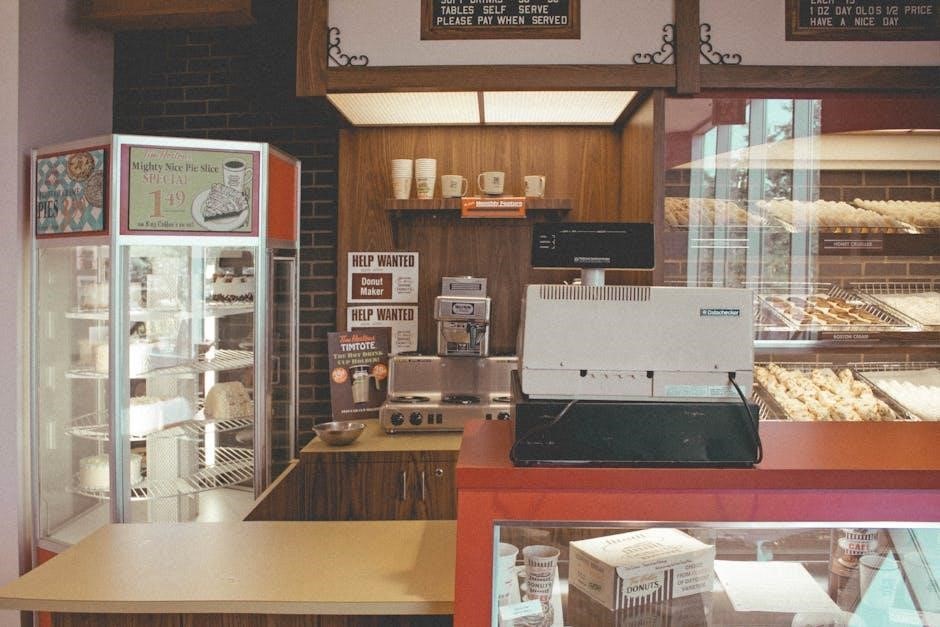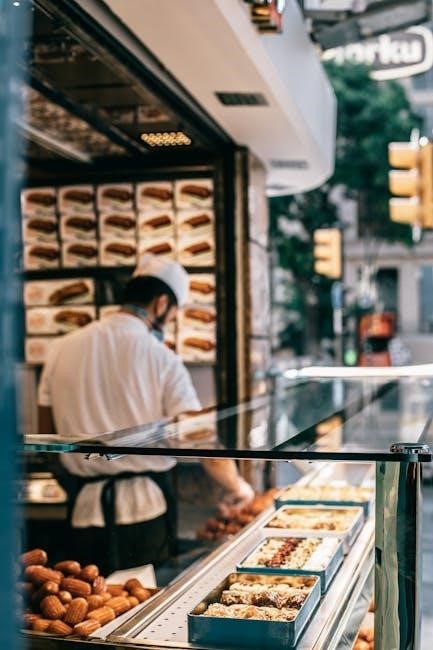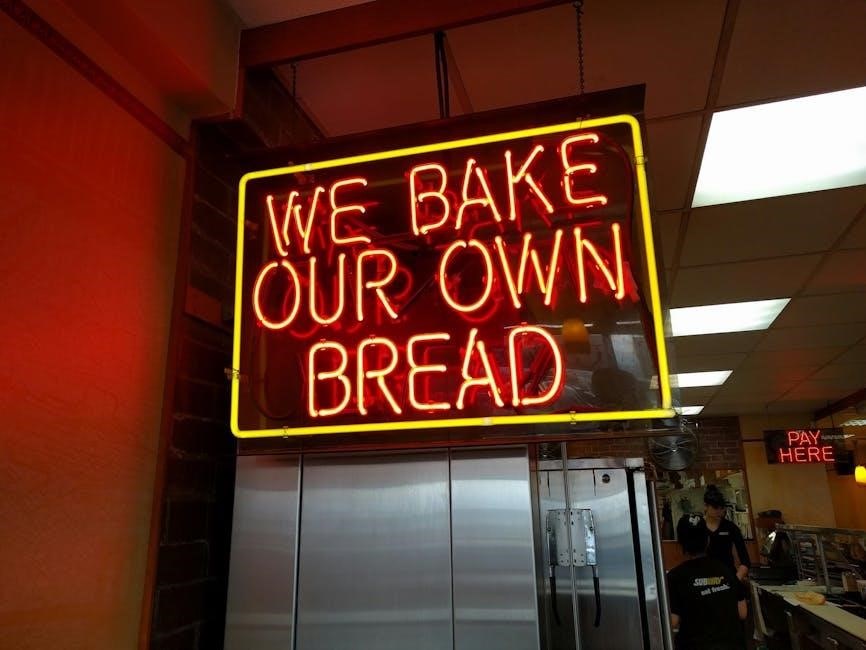Executive Summary
A bakery shop business plan outlines the strategy for a profitable venture‚ focusing on high-quality products‚ target market analysis‚ and financial projections to ensure sustainable growth.
It includes startup costs‚ operational plans‚ and marketing strategies to establish a competitive edge in the bakery industry.
1.1 Business Overview
The bakery shop aims to provide high-quality‚ organic‚ and healthy products‚ catering to a diverse customer base. Led by experienced founders‚ the business focuses on creating a welcoming environment with unique recipes. The shop will specialize in custom cakes‚ artisan bread‚ and pastries‚ ensuring freshness and sustainability. By leveraging local suppliers and state-of-the-art equipment‚ the bakery strives to become a trusted brand in its community‚ offering exceptional taste and service.
1.2 Vision and Mission Statement
The bakery’s vision is to be the leading provider of fresh‚ organic‚ and innovative baked goods‚ setting a new standard in the industry. Our mission is to deliver exceptional quality‚ foster customer loyalty‚ and create a welcoming environment that reflects our passion for baking. We aim to inspire joy through every product‚ ensuring every bite exceeds expectations and builds lasting connections with our community.

1.3 Objectives
Our primary objectives include establishing a strong market presence‚ achieving consistent revenue growth‚ and providing high-quality‚ organic products. We aim to build customer loyalty through exceptional service‚ expand our product range to meet diverse preferences‚ and maintain operational efficiency. By year three‚ we target a 15% market share and plan to explore wholesale opportunities‚ ensuring long-term sustainability and expansion in the bakery industry.
Market Analysis
The bakery industry is growing steadily‚ with increasing demand for organic and artisanal products. The U.S. market includes 2‚800 commercial bakeries and 6‚000 retail bakeries‚ generating $30 billion annually.
2.1 Bakery Industry Overview
The bakery industry has evolved significantly‚ driven by consumer demand for diverse and high-quality products. The U.S. market comprises over 2‚800 commercial bakeries and 6‚000 retail bakeries‚ generating $30 billion in annual revenue. The industry is characterized by a mix of traditional and modern bakeries‚ with a growing emphasis on organic and artisanal offerings. This trend reflects shifting consumer preferences toward healthier and unique baked goods.
2.2 Target Market
The target market includes health-conscious individuals‚ busy professionals‚ and families seeking fresh‚ organic‚ and artisanal baked goods. The bakery aims to attract a loyal customer base by offering high-quality‚ customizable products tailored to diverse preferences. This includes gluten-free and vegan options‚ catering to specialized dietary needs. By focusing on convenience and quality‚ the bakery will capture a significant share of the local market‚ ensuring long-term customer loyalty and consistent demand for its offerings.
2.3 Competitive Analysis
The bakery industry is competitive‚ but opportunities exist by focusing on quality‚ customization‚ and organic ingredients. While established bakeries dominate the market‚ many lack specialization in niche products. By offering unique‚ handcrafted items and superior customer service‚ the bakery can differentiate itself. Additionally‚ sourcing ingredients locally ensures freshness and supports community suppliers‚ enhancing the brand’s appeal. This strategy will help the bakery carve a distinct position in a crowded market‚ attracting loyal customers seeking premium products.
Products and Services
The bakery will offer a variety of fresh‚ high-quality products‚ including bread‚ pastries‚ cakes‚ and specialty items‚ with options for customization and special orders to meet customer preferences.

3.1 Product Description

The bakery will specialize in offering a wide variety of high-quality‚ fresh‚ and delicious baked goods‚ including bread‚ pastries‚ cakes‚ and specialty items. All products will be made with premium ingredients to ensure superior taste and texture. Customization options will be available for cakes and other treats‚ catering to individual preferences and dietary needs. The product line will also feature seasonal offerings to keep the menu fresh and exciting for customers.
3.2 Pricing Strategy
The bakery will implement a competitive pricing strategy‚ balancing affordability and premium quality. Prices will reflect the cost of high-quality ingredients and craftsmanship. Standard items like bread and pastries will be moderately priced‚ while specialty and custom orders will be priced higher. Discounts will be offered for bulk purchases and loyalty programs to attract repeat customers. Transparent pricing will ensure customer trust and satisfaction.
3.4 Customization and Special Orders
The bakery will offer customization options for special occasions‚ such as weddings‚ birthdays‚ and holidays‚ allowing customers to tailor designs‚ flavors‚ and sizes. Special orders will require a minimum notice period to ensure quality and precision. Gluten-free‚ vegan‚ and sugar-free options will cater to dietary preferences. Customers can choose from pre-designed templates or collaborate with our team to create unique creations‚ enhancing their experience and building brand loyalty.

Operations Plan
The bakery will operate efficiently‚ managing production processes‚ inventory‚ and supply chain to ensure consistent product quality and meet customer demand effectively every day.
4.1 Location and Layout
The bakery will be strategically located in a high-traffic area‚ such as downtown or near residential zones‚ to maximize visibility and accessibility. The layout will feature a welcoming retail space with display cases showcasing products‚ a production area equipped with essential baking equipment‚ and a storage section for ingredients and supplies. The design will ensure efficient workflow‚ from preparation to customer service‚ while maintaining a clean and inviting environment for patrons.
4.2 Staffing and Training
The bakery will employ experienced bakers‚ counter staff‚ and a manager to ensure smooth operations. Staff will undergo comprehensive training in baking techniques‚ customer service‚ and quality control to maintain high standards. Ongoing training will be provided to adapt to market trends and customer preferences. Competitive wages and a supportive work environment will foster employee retention and satisfaction‚ ensuring the bakery runs efficiently and delivers exceptional products and service to its customers.

4.3 Suppliers and Equipment
The bakery will source high-quality ingredients from trusted suppliers to ensure consistency and freshness. Essential equipment includes industrial mixers‚ ovens‚ and display cases‚ purchased from reputable manufacturers. Used equipment will be considered to reduce startup costs. Regular maintenance schedules will be implemented to ensure equipment longevity and efficiency. Reliable suppliers and well-maintained equipment are critical to meeting production demands and delivering superior products to customers‚ supporting the bakery’s long-term success and operational excellence.

Marketing and Sales Strategy
The bakery will implement branding‚ promotions‚ and loyalty programs to attract customers. Sales channels include in-store purchases‚ online orders‚ and partnerships with local cafes‚ ensuring wide reach and customer engagement through social media and community events.
5.1 Branding and Promotion
The bakery will focus on creating a strong brand identity emphasizing quality and freshness. Promotional strategies include social media campaigns‚ email marketing‚ and in-store tastings.
Partnerships with local businesses and participation in community events will enhance visibility. Loyalty programs and seasonal promotions will encourage repeat business and attract new customers.
5.2 Sales Channels
The bakery will utilize multiple sales channels to maximize reach. The primary channel is the retail shop‚ offering a wide range of baked goods. Online ordering and delivery services will cater to busy customers. Wholesale partnerships with local cafes and restaurants will expand market presence. Farmers’ markets and food festivals will provide additional avenues for sales‚ ensuring diverse revenue streams and increased brand visibility.
5.3 Customer Engagement
Building strong customer relationships is crucial. The bakery will implement loyalty programs‚ offering rewards for repeat purchases. Social media platforms will be used to share recipes‚ behind-the-scenes content‚ and promotions‚ fostering community engagement. Customer feedback will be collected through surveys and online reviews to improve services. Hosting baking workshops and seasonal events will also enhance customer interaction and brand loyalty‚ creating a personalized experience that drives retention and referrals.
Financial Plan
The financial plan outlines startup costs‚ revenue projections‚ and expense management. It ensures sustainable growth through detailed budgeting and strategic financial planning for the bakery’s success.
6.1 Startup Costs
The bakery shop business plan PDF outlines initial startup costs‚ including location purchase or lease‚ equipment‚ and interior design. Additional expenses cover permits‚ ingredients‚ and initial operational costs. The total investment is estimated at $250‚000‚ with a significant portion allocated to securing a prime location and purchasing high-quality baking equipment. Detailed financial breakdowns ensure clarity and preparedness for launching the bakery successfully.
6.2 Revenue Projections

The bakery shop is projected to generate $50‚000 in monthly sales within the first year‚ with a growth rate of 5-7% annually. Revenue streams include walk-in sales‚ custom orders‚ and wholesale partnerships. The bakery industry’s annual revenue exceeds $30 billion‚ indicating strong market potential. By focusing on quality and customer satisfaction‚ the shop aims to achieve consistent revenue growth and establish a loyal customer base.
6.3 Expense Projections
Initial startup costs include $1‚750‚000 for location purchase and equipment. Monthly expenses cover rent‚ utilities‚ ingredients‚ and staffing‚ estimated at $30‚000. Annual expenses for maintenance and marketing are projected at $50‚000. The bakery aims to balance costs with revenue growth‚ ensuring profitability within the first three years. Proper financial planning and inventory management will help optimize expenses and sustain operations effectively.

Management Structure
The bakery is led by experienced founders‚ with clear roles in operations‚ finance‚ and marketing. A structured organizational chart ensures efficient decision-making and smooth daily operations.
7.1 Founders and Key Personnel
The bakery is founded by John Smith‚ a seasoned baker with 15 years of experience‚ and Emily Davis‚ an expert in bakery operations. Key personnel include a head baker‚ sales manager‚ and customer service team. Their combined expertise ensures high-quality products and excellent customer service‚ driving the bakery’s success and growth in the competitive market.
7.2 Organizational Chart
The bakery’s organizational chart begins with the Founder/CEO at the top‚ overseeing Operations‚ Finance‚ and Marketing. The Head Baker manages production‚ while the Sales Manager leads customer service and retail teams. Key roles include a Pastry Chef‚ Supply Chain Manager‚ and Administrative Assistant. This clear hierarchy ensures efficient decision-making‚ streamlined workflows‚ and effective communication across all departments‚ supporting the bakery’s operational and strategic goals.
This bakery shop business plan outlines a clear roadmap for success‚ emphasizing quality products‚ strategic marketing‚ and efficient operations. By leveraging market demand for fresh‚ organic offerings‚ the bakery aims to establish a loyal customer base. With a solid financial foundation and a skilled team‚ the business is poised for growth and long-term profitability‚ ensuring a sweet and sustainable future in the competitive bakery industry.
